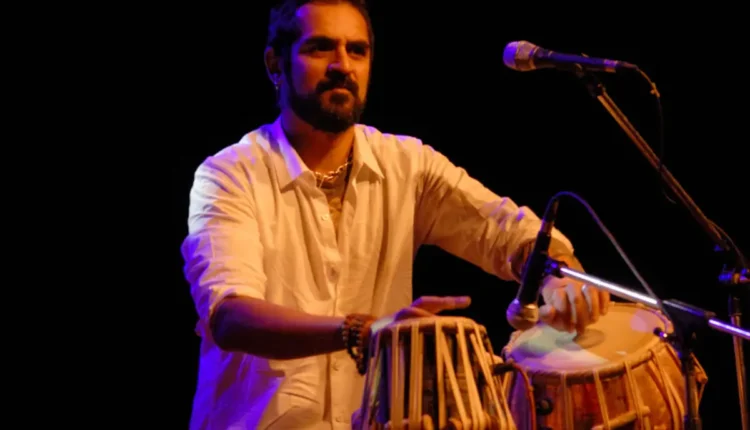Born as Utkarsh Kale on November 1, 1974, in West Bromwich, UK, to Indian Marathi-speaking immigrants, Karsh Kale’s musical journey began with the rich tapestry of sounds he encountered in his upbringing.
Raised in Stony Brook, New York, Kale’s exposure to diverse musical influences, courtesy of his father, laid the foundation for his future as a pioneering musician. Immersed in traditional Indian melodies, classical compositions, rock anthems, and early hip-hop beats, Kale’s musical palette was eclectic and expansive from an early age.
Karsh Kale: The Tabla Virtuoso
From an early age, Kale exhibited a keen interest in drums, eventually finding his calling in the tabla. Self-taught and driven by passion, he devoted countless hours to mastering the intricacies of this classical percussion instrument.
Drawing inspiration from both classical Indian maestros and contemporary Western musicians, Kale developed a unique style that seamlessly fused traditional tabla rhythms with modern electronic sounds. His “electric tabla” became a symbol of innovation within the music industry, earning him accolades and admiration from peers and fans alike.
Tabla Beat Science
In 2000, Karsh Kale joined forces with musical luminaries such as Zakir Hussain, Talvin Singh, and Sultan Khan to form Tabla Beat Science. Their groundbreaking collaboration resulted in the release of “Tala Matrix,” a seminal work that redefined the fusion music landscape.
Kale’s electrifying tabla performances within electronic contexts garnered widespread acclaim, establishing him as a pioneer of the Asian Underground genre. The success of Tabla Beat Science not only showcased Kale’s virtuosity but also solidified his reputation as a trailblazer in the realm of world music.
Solo Career
Venturing into solo territory, Karsh Kale made waves with his debut EP, “Classical Science Fiction from India,” in 1999. Signed by Six Degrees Records, he became the first Indo-American artist to secure a solo recording contract in the US.
His subsequent albums, including “Realize” (2001) and “Breathing Under Water” (2007), showcased his prowess as a composer and producer, blending diverse musical elements with seamless precision.
Kale’s ability to seamlessly blend traditional Indian melodies with contemporary electronic beats earned him widespread acclaim, propelling him to the forefront of the global music scene.
Collaborative Ventures
Karsh Kale’s insatiable thirst for collaboration led him to collaborate with an eclectic array of artists, from Sting to U2, transcending cultural and geographical boundaries.
His contributions to Bollywood, highlighted by the score for the 2019 hit film “Gully Boy,” underscored his versatility and innovation as a musician. Kale’s collaborative ventures not only enriched his own musical repertoire but also fostered cross-cultural dialogue and understanding through the universal language of music.
Musical Versatility
Beyond his solo career, Karsh Kale has made significant strides in the realms of film and television scoring, with his compositions featured in crossover and Bollywood films alike.
His tracks have found resonance in popular TV shows, further solidifying his reputation as a versatile and sought-after composer. Kale’s ability to evoke emotion and atmosphere through his music has made him a sought-after collaborator in the world of visual media, where his compositions enhance the storytelling experience and elevate the overall impact of the narrative.
Also Read: Rajan Somasundaram: Bridging Past and Present Through Music

